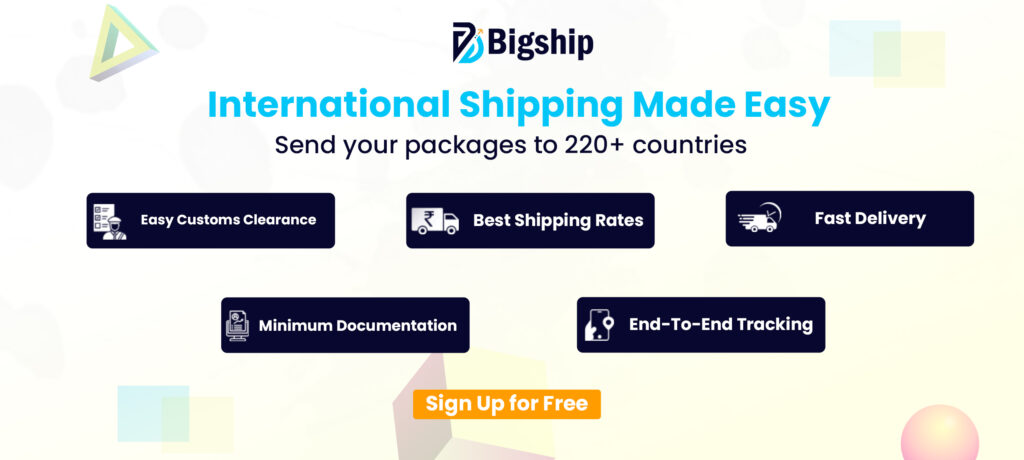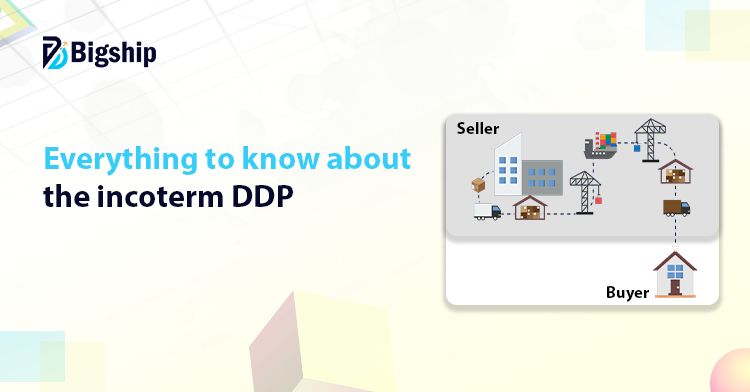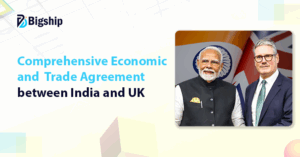Have you ever heard about DDP in shipping? If you sell or buy across borders, you must have definitely heard about it. DDP stands for Delivered Duty Paid, and it changes how costs, risks, and responsibilities are shared between seller and buyer. In fact, among all the incoterms or international commercial terms, the DDP incoterm puts the maximum responsibility on the seller. That is why many e-commerce sellers and buyers pay close attention to it.

In this blog, we’ll walk you through the meaning of DDP, its working, obligations, and you will also find why it matters in global trade.
What does DDP mean in shipping?
DDP meaning in shipping, is Delivered Duty Paid. Under this term, the seller takes full charge of the shipment until it reaches the buyer. The seller pays for transport, duties, and taxes, and the buyer only needs to wait for the goods at the final destination.
DDP incoterms are part of the rules set by the International Chamber of Commerce. These rules define how buyers and sellers share responsibilities in global trade. Under DDP, the seller carries almost all the responsibility. The seller clears customs, pays import and export duties, and covers every risk until the goods arrive at the named place.
The named place is an agreed location between the buyer and seller. It can be a warehouse, office, or another spot chosen for delivery. In short, DDP means the seller manages the full process whereas, the buyer only pays for the goods.
Working of DDP in shipping
In DDP shipping, the seller handles every step of the process until the goods reach you. The seller pays for transport, arranges insurance, and clears the goods at both export and import customs. Duties and taxes are also covered by the seller.
Once the goods leave the origin, the seller makes sure they reach the agreed location in the destination country. This may include dealing with customs officials, preparing documents, and managing delivery. The buyer receives the shipment ready for unloading without extra charges on arrival.
Seller obligations under DDP
When you look at DDP shipping, the seller carries most of the load. These are the main duties the seller must take care of:
Arranging transport: The seller organizes the movement of goods right from the origin to the final point in the destination country.
Taking care of insurance: To protect the goods during the journey, the seller arranges insurance. This ensures that the buyer gets the shipment safe and covered against risks.
Packing the goods: The seller packs the items properly so they stay secure during shipping.
Paying export charges: Any duties or taxes applied by the exporting country are paid by the seller.
Clearing customs: The seller handles customs work in both countries. This includes submitting paperwork and completing formalities for export and import.
Delivering the goods: The seller makes sure the shipment reaches the agreed location. Sometimes, the final step may also involve unloading, totally depending on the deal.
Buyer obligations under DDP
In Delivered Duites Paid, the buyer’s role is light compared to other trade terms. Most of the work rests on the seller, while the buyer only handles a few steps.
Accepting delivery: The buyer needs to be ready to receive the shipment at the location mentioned in the agreement.
Unloading goods: Once the shipment arrives, the buyer takes care of unloading it from the vehicle. This is usually the only physical responsibility left for the buyer.
Why e-commerce sellers use DDP in shipping?
E-commerce sellers often prefer Delivered Duty Paid or DDP in shipping for their international orders. It helps them win customer trust and avoid delivery problems. Let’s see why it matters.
Customer confidence: Buyers feel secure when there are no hidden charges at delivery. They pay the final price upfront and wait for the goods without worrying about customs fees.
Safe delivery: The seller controls the whole process. They choose reliable routes, handle customs, and cover duties. This reduces risks like damage or delays during transit.
Transparent shopping experience: Buyers see the exact cost of their order at checkout and no extra fees appear later. This makes online shopping easier and more predictable.
Global reach: By using DDP shipping, sellers can target more countries. Buyers abroad are more likely to order when shipping is simple and clear.
Comparison of Incoterms: DDP vs. DDU vs. DAP
DDP, DDU, and DAP have different roles in international shipping. Let’s see how they differ from one another.
| DDP | DDU | DAP |
| The full form of DDP is Delivered Duty Paid. | The full form of DDU is Delivered Duty Unpaid. | The full form of DAP is Delivered At Place |
| Under DDP, sellers pay for everything. | Under DDU, buyers pay for everything. | Under DAP, sellers pay except for the duties. |
| Seller handles transport, customs, and all duties until delivery. | Seller sends goods to the buyer’s country but does not cover import duties. | Seller pays transport and risks until goods arrive at the destination. |
| Buyer only receives and unloads goods. | Buyer pays duties and may need to collect goods from customs or the post office. | Buyer covers local import duties and taxes. |
Key Takeaways
- DDP meaning in shipping is Delivered Duty Paid.
- Under the incoterm DDP, the seller carries almost all costs and risks.
- In DDP, seller covers transport, insurance, duties, and customs clearance.
- The buyer’s role in DDP shipping is limited to receiving and unloading goods.
- Compared to DDU and DAP, DDP gives the buyer the easiest experience.
Conclusion
DDP shipping creates clarity in international trade. The seller takes care of transport, customs, and duties, while the buyer only needs to accept and unload the goods. This clear division of roles reduces confusion and surprise costs.
For global trade, DDP stands out as one of the most customer-friendly options. It brings certainty to the process and makes international orders easier to manage for both sides, building confidence in every cross-border transaction.
FAQs
What does DDP mean in shipping for international trade?
DDP or Delivered Duty Paid means the seller pays for transport, customs, and duties until delivery to the buyer.
How is DDP different from other incoterms?
DDP terms put the highest responsibility on the seller compared to other trade rules.
Why is DDP incoterm important in global trade?
DDP is important in global trade because it provides clarity on who handles costs and reduces disputes between buyer and seller.





